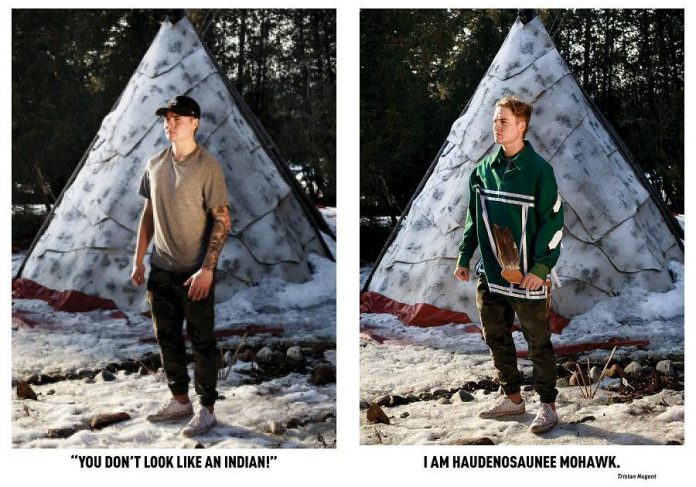
‘Breaking Down Stereotypes’, a photo-based community art project that confronts racism and celebrates Indigenous identity, is the first in a series of micro-exhibitions programmed for November and December at Artspace in downtown Peterborough.
Betty Carr-Braint, cultural advisor and Indigenous counsellor at Trent University, has supported Indigenous students at Trent’s First Peoples House of Learning for the last five years. Part of her work involves assisting Indigenous students who are struggling with the ongoing impacts of colonization and historical trauma.
During her time at Trent, Carr-Braint has encountered many students who were troubled by the stereotyping they had regularly faced from professors, students, and staff at the university as well as from members of the greater Peterborough community.
“I heard over and over from students about the racism they were facing in their daily lives,” recalls Carr-Braint, who played a curatorial role in ‘Breaking Down Stereotypes’, on display at Artspace until Saturday, November 14th. “I started to think about how we can combat this in a way that gets our point across.”
“I’ve always thought that a picture speaks a thousand words, so I contacted Annie and she helped us to create what we wanted.”
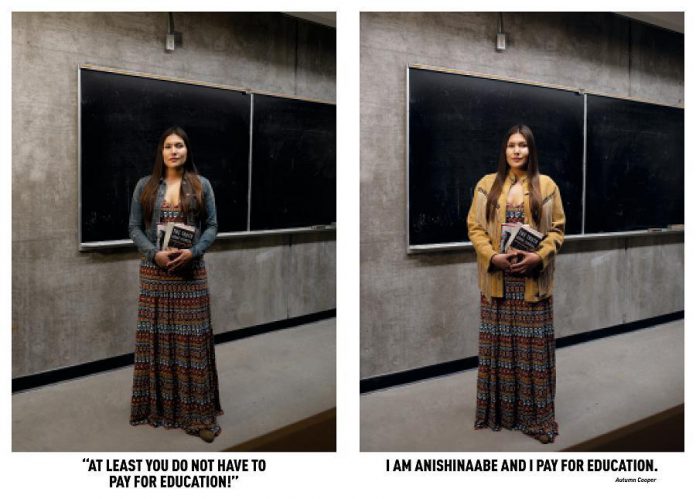
Carr-Braint had already collaborated with award-winning photojournalist and filmmaker Annie Sakkab (anniesakkab.com) for another photo-based project that focused on women in Tyendinaga territory.
“She’s very accomplished,” says Carr-Braint. “I feel very blessed to have her as part of my life, and she did an outstanding job. It’s a vision that we wanted to get out there.”
‘Breaking Down Stereotypes’ uses Sakkab’s photos of Indigenous Trent students combined with text that identifies and counters stereotypes, selected and crafted by each student participant, to confront racism in a profound way.
The project, in many ways, emblematizes the spirit of the Jewish ethical metaphysician, Emmanuel Levinas, who developed an ethics of human relations founded on one’s encounter with the face of the other. The photo series challenges stereotypical perceptions and seeks to change them.
“The messaging is designed to educate others because so many students were struggling with these comments,” Carr-Braint explains. “We really want people to think about what it is they’re saying and what impact their words might have on Indigenous people.”
“The students need to be acknowledged for their courage stepping forward and sharing their stories. I think it’s powerful — I don’t think the students realized their power in it until they stepped into it and got to see it presented.”
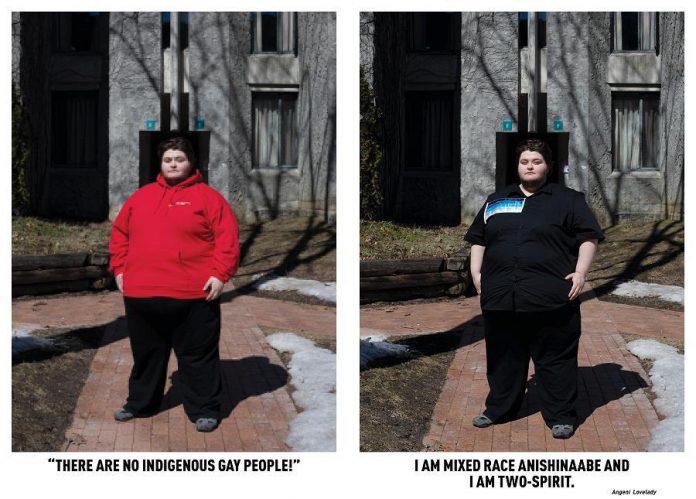
By challenging and breaking down Indigenous stereotypes, the photo-based project also creates a powerful space for the student participants to restore, revitalize, and reclaim their own cultural identities.
“In 2020, Indigenous people come in all colours,” says Carr-Braint. “We’re not just one colour anymore. That stereotype is still present but that’s not the reality today.”
The photo-based project was originally exhibited at the 2019 Elders Gathering at Trent, where it received much acclaim. Jonathon Lockyer, Artspace’s director and curator, saw the project there and arranged for the work to be exhibited at Artspace.
“Originally, the exhibition at Artspace wasn’t going to happen until 2021,” recalls Carr-Braint. “But with everything that happened with COVID, the space opened up and we were able to show there. We’re really excited about it.”
The project has resonated well beyond Peterborough/Nogojiwanong, explains Carr-Braint.
“We had so many other colleges and universities come forward asking if they can share the work at their institutions because they were battling the same thing,” she says. “I didn’t think about it that way, but there’s a real need for it so we’re working on getting it to other schools too.”
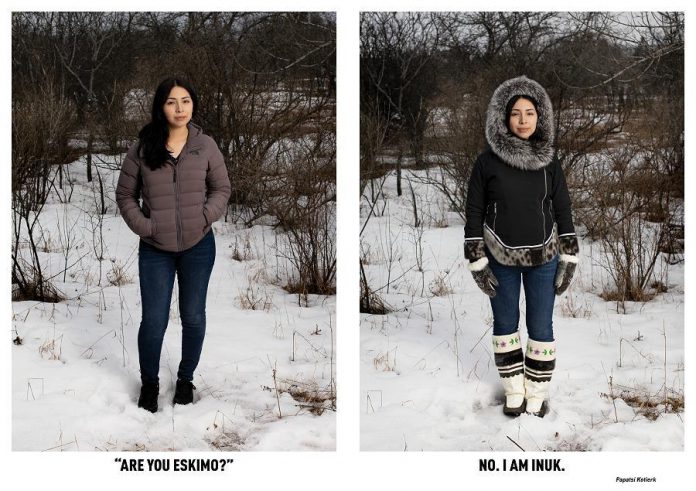
Carr-Braint notes the students who participated in the project have been surprised by the reaction to the project, telling her “they didn’t really realize what a big deal it was that they were doing this.”
“I really want to acknowledge their courage to speak out so publicly,” she says. “I’m so grateful for their courage. The students tell me they’re glad they were able to speak to some of the things they were experiencing not only at the university but in Peterborough and the surrounding area as well.”
Systemic racism is the product of an entire system of long-existing structures in society. It manifests itself in our public institutions where stereotypes, biases, and prejudices can have real-life consequences. A quick look at the Canadian news cycle over the last month alone demonstrates how detrimental the consequences of stereotypes can be.
For example, Brayden Bushby — the Thunder Bay man accused of throwing a trailer hitch from a car and hitting Barbara Kentner from Wabigoon Lake First Nation, who eventually succumbed to her injuries — stands trial on charges of manslaughter, not second-degree murder.
In another example, Chief Michael Sack of Sipekne’katik First Nation in southwestern Nova Scotia recently announced that — after weeks of harassment, intimidation, vandalism, violence, and destruction committed by non-Indigenous mobs — the band will not fish in the upcoming lobster season despite having a treaty right to do so.
And, despite insistence from numerous legal experts, no criminal investigation has been initiated regarding the death of Joyce Echaquan, an Atikamekw woman who died in a Quebec hospital as she recorded hospital staff abusing her.
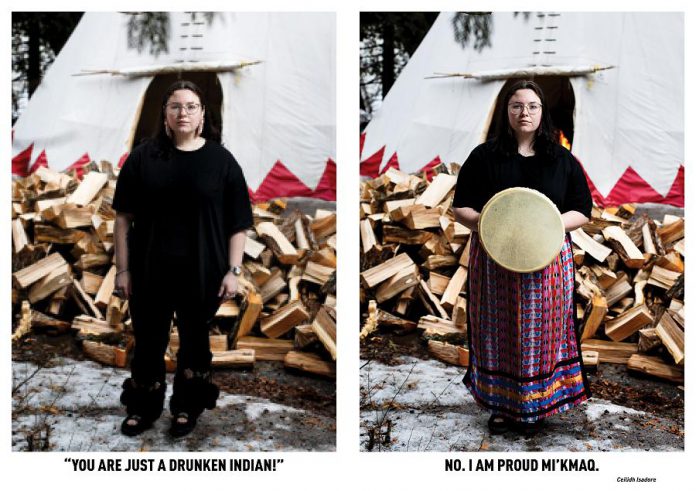
These few examples alone demonstrate Canada has a real problem with systemic racism. Denying that it exists is a barrier to reconciliation that contributes to further harm to Indigenous peoples.
“We hear different stories across Canada about what’s happening with Indigenous people and we can see how present racism still is,” Carr-Braint says. “Breaking Down Stereotypes is such an important project, not only for this time but for future times as well.”
It is clear there is much work to be done to end systemic racism in Canada. Reconciliation is a continuous, multifaceted, and complex process that works towards solidarity as a society and country. Reconciliation begins with oneself and then extends into our families, relationships, workplaces, and eventually into our communities and institutions.
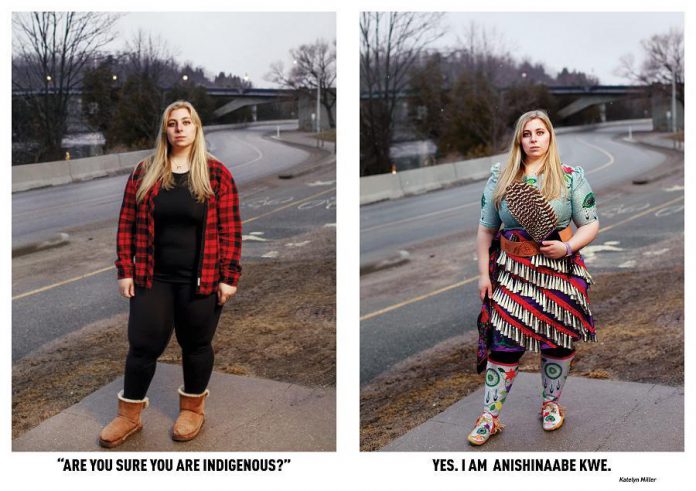
“I believe in the project,” says Carr-Braint. “I believe it’s making a difference — that’s what I need to believe, that it’s making a difference.”
To honour and bear witness to the students who participated in the Breaking Down Stereotypes project, visit the Artspace gallery at 378 Aylmer Street in downtown Peterborough. The exhibit is on display now until Saturday, November 14th and admission is free.
Artspace is open from 11 a.m. to 5 p.m. on Thursday and Friday and noon to 4 p.m. On Wednesday, you can book a private viewing by appointment by emailing Bec at bec@artspace-arc.org or calling the gallery at 705-748-3883. For more information, including COVID-19 protocols in place at the gallery, visit artspace-arc.org/about/contact/.


























